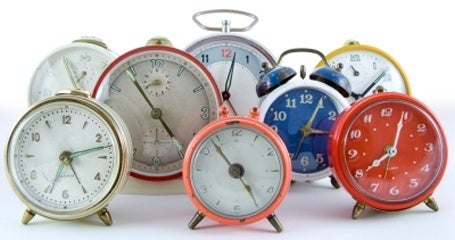1. Increasing hunger: Sleep deprivation may alter the hormones that control hunger. (18) One small study, for example, found that young men who were deprived of sleep had higher levels of the appetite-stimulating hormone ghrelin and lower levels of the satiety-inducing hormone leptin, with a corresponding increase in hunger and  appetite-especially for foods rich in fat and carbohydrates. (19)
appetite-especially for foods rich in fat and carbohydrates. (19)
2. Giving people more time to eat: People who sleep less each night may eat more than people who get a full night’s sleep simply because they have more waking time available. (20) Recently a small laboratory study found that people who were deprived of sleep and surrounded by tasty snacks, tended to snack more-especially during the extra hours that were awake at night-than when they had adequate sleep (21).
3. Prompting people to choose less healthy diets: Observational studies have not shown a consistent link between sleep and food choices. (2) But one study of Japanese workers did find that workers who slept fewer than six hours a night were more likely to eat out, have irregular meal patterns, and snack than those who slept over six hours. (22)
References
2. Patel SR, Hu FB. Short sleep duration and weight gain: a systematic review. Obesity (Silver Spring). 2008; 16:643-53.
18. Taheri S, Lin L, Austin D, Young T, Mignot E. Short sleep duration is associated with reduced leptin, elevated ghrelin, and increased body mass index. PLoS Med. 2004; 1:e62.
19. Spiegel K, Tasali E, Penev P, Van Cauter E. Brief communication: Sleep curtailment in healthy young men is associated with decreased leptin levels, elevated ghrelin levels, and increased hunger and appetite. Ann Intern Med. 2004; 141:846-50.
20. Taheri S. The link between short sleep duration and obesity: we should recommend more sleep to prevent obesity. Arch Dis Child. 2006; 91:881-4.
21. Nedeltcheva AV, Kilkus JM, Imperial J, Kasza K, Schoeller DA, Penev PD. Sleep curtailment is accompanied by increased intake of calories from snacks. Am J Clin Nutr. 2009; 89:126-33.
22. Imaki M, Hatanaka Y, Ogawa Y, Yoshida Y, Tanada S. An epidemiological study on relationship between the hours of sleep and life style factors in Japanese factory workers. J Physiol Anthropol Appl Human Sci. 2002; 21:115-20.